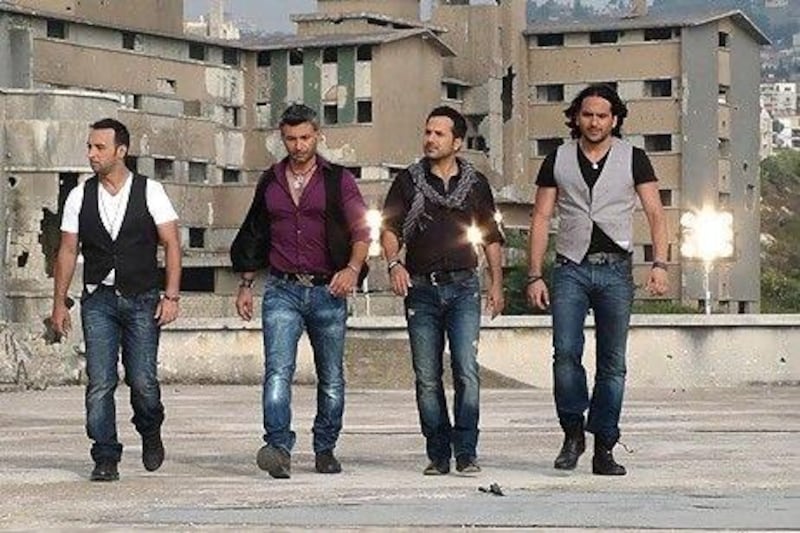It's not every boy band that embraces three different Iraqi ethno-religious groups and practises guitar in a bomb shelter. UTN1, or Unknown To No One - Hassan Ali Al Falluji, Shant Garabedian, Artin Haroutiounian and Akhland Raof - fled Baghdad after the Iraq War to settle in Virginia and take aim at western pop stardom. Al Falluji explains where they're at and where they're going.
So exactly how do four Iraqi kids end up in a boy band?
First of all, music was really hard to get in Iraq, there were few places where you could buy CDs or tapes back then. Only the minority would hear or be inspired by western music or culture. But we were from open-minded families - my father used to listen to The Beatles a lot. We all shared a love for people such as Michael Jackson, Bon Jovi and Van Halen in the 1980s. So some of us used to travel to other nearby countries to get music and bring it back to Baghdad. The nature of that music, the energy, the beat - everything. Music is just a matter of what your ear accepts. And the attraction of the unknown - this was something so far away from you and totally different.
How did you form a band in that environment?
There used to be one radio station that was run by Uday, the son of Saddam Hussein, called VOY - Voice of Youth - for English music, which was surprising back then. It had a couple of thousand listeners. One day, in late 1999, we heard an ad for a two-piece band looking for other musicians. We didn't have internet access or mobile phones, but they mentioned a PO box. A few weeks later we met and we had a weird chemistry - they were talented and had a plan to do original music, a pop-rock/boy band style. The Backstreet Boys and Take That were big then.
You guys come from diverse ethnic backgrounds, right?
We never planned it, but it turned out each of us was from a different ethnic group. I'm an Arab Shiite, Marwan is a Sunni Kurd, Shant is Armenian Christian.
Was it dangerous to cross those lines?
Actually, back then, there wasn't a lot of sectarian tension. Moving towards western culture was the bigger challenge, because the Saddam regime was against it. But we were young guys with dreams and hopes and we wanted to escape the reality of daily life there, which was very monotonous. People were not allowed to travel. No western TV, no internet, a very closed society. This was our escape from it. Right before the war, in 2003, the Sunday Telegraph and Newsday came to Iraq to interview us. We didn't have government permission to do that and we were about to be questioned or jailed but, luckily, the war came.
Luckily?
I just mean they didn't have the time to pursue us. And after the war, we got tons of coverage - Fox, CNN, BBC, The New York Times. Then we met with a company, LCI Entertainment, that got us visas to London, but it was hard for us to stay, so we settled in Lebanon. And that was our big breakthrough: singing in Arabic as well as English, we had number one hits there. But yes, there was danger. Our manager, Alan Enwiyah - do you remember Jill Carroll, the American journalist [for the Christian Science Monitor] who was kidnapped in Iraq in 2006? - Alan was the driver who was shot and killed. He really did a lot for the band; he sent our CD to many places in Jordan and the UK.
What was life like under Saddam?
It was monotonous; life without any connection to anybody. Buying a TV was a hard thing. Most people, though, didn't know what was going on in the country. The media was very closed, so how would you know any of the bad things that took place?
What was it like during the war?
It wasn't very long - a month. You have [intense] emotions when you're going through that. We all sometimes thought maybe the band is not going to make it. The whole thing was never planned, but it was like destiny. We would go to shelters and I would practise guitar all the time in there - Shant and Artin used to make fun of me. A lot of my friends still make that joke - the bombs are falling, and Hassan is singing for us!
As the bombs were dropping, did you ever hate the US or the West?
It was a closed country and we felt the change was really needed for the society, no matter what the consequences, even if we went through hell. War is never fun. But at the same time, those dreams of being like any other person in the world - travelling, communicating with others - that was a motivation for us to support change.
How did you end up in the US?
We have refugee status. The first show we did in the US was at a cafe called Busboys and Poets in Washington. It was a small concert for 150 people. Initially, we were imitators. As we got better on our instruments, we evolved more into a pop-rock band.
What's the significance of the name UTN1?
Unknown To No One - it's "known to everyone" but in reverse. Artin read it in a Shakespeare book and used it as a goal that we will be known to everyone some day. We still believe. We still have hope that one day we will have commercial success here because we have the musical tools and the story to make something happen.





